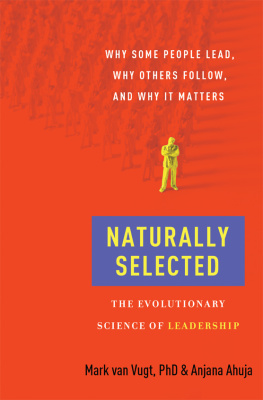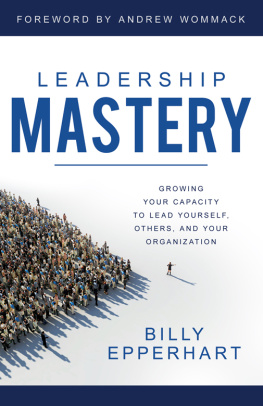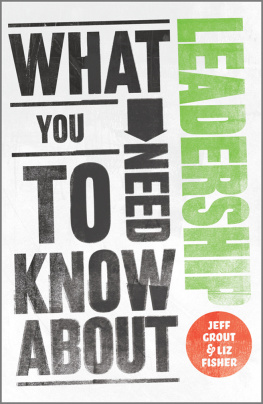Contents
T here they are, laid out joyously on your kitchen table: two job offers from two different companies. The generous pay packet is the same, although the benefits vary a little, and both demand the skills that you somewhat creatively claimed for yourself on your CV. Unsure about which way to turn, you consult the oracle of the 21st century: Google. You look up information about each companys chief executive officer, as a way of gauging the culture, the heartbeat, of the organisation you might turn your life over to. Your discovery? That, as of last year, one CEO lets call him John earns a salary of a dollar a year. This is no tricksy financial illusion: there are no lavish stock options to cushion the miserly blow. Your heart sinks, because you think it could be a sign that the company is in decline.
Then you spot the letter he sent to his employees the previous year, stating, The tremendous success of [the company] has provided me with far more money than I ever dreamed Id have and far more than is necessary for either my financial security or personal happiness I am now 53 years old and I have reached a place in my life where I no longer want to work for money, but simply for the joy of the work itself and to better answer the call to service that I feel so clearly in my own heart. Beginning [this year], my salary will be reduced to $1, and I will no longer take any other cash compensation John goes on to say that the company is starting a hardship fund for employees, and that the company board has decreed that nobody, not even the directors, can be paid more than 19 times the average salary earned on the shop floor.
And then theres the other CEO, Lawrence. He is a constant fixture on the list of the worlds best-paid CEOs. He has a fleet of private jets and lives in one of the most expensive homes in the world, a 23-acre Japanese-themed extravaganza. And one of the most memorable things you find online about him is a joke: Whats the difference between Lawrence and God? God doesnt think hes Lawrence. Then comes the mental maths: with a remuneration of $57 million, Lawrence earns 1,000 times the salary youve been promised.
You might want to be Lawrence, but the likelihood is that youd feel more comfortable answering to John. Why? Its hard to articulate; the feeling is based more on instinct. You could go out for a beer with John; youd feel like a serf sipping sake with Lawrence. By the way, these are not mythical CEOs but real ones: John Mackey, of Whole Foods Market, the organic foods company, and Larry Ellison, who runs the software giant Oracle.
Our brand new theory of leadership, grounded in evolutionary science, explains why a potential employee is more likely to plump for John than for Lawrence (unless youre the kind of person who really does want to be Larry Ellison, in which case youll swallow the short-term inequity for the slim possibility of a spectacular long-term gain). Not only that, but, when viewed in the context of this theory, much of human behaviour the leadership styles we prefer, and those we abhor begins to make sense: why we dont like middle managers, why we prefer the political devil we know to the angel we dont, why we bristle at extravagance among leaders, and why there is universal interest in the domestic minutiae of political figures. Our theory accommodates all the familiar features of the leadership landscape charisma, personality traits, alpha males, the glass ceiling for women, nature versus nurture but, unlike other leadership theories, brings them together in a way that makes sense.
We have a name for this bigger picture: evolutionary leadership theory (ELT). Its name reflects our contention, backed up by observations and experiment, that leadership and followership emerged during the course of human evolution and that their foundations were laid long before humans evolved. We call them adaptive behaviours. When scientists use the word adaptive to describe a behaviour, they mean that it emerged during the course of evolution in order to enhance an organisms chances of reproduction by enabling it to adapt to the environment. Evolution selected for a combination of leaders and followers in human society; a template for these behaviours eventually became hard-wired into the human brain. As youll see, there is an abundance of evidence that leadership and followership are automatic and (usually) beneficial. Groups of strangers speedily and spontaneously arrange themselves into a led group when asked to carry out a task, and led groups invariably fare better than groups without leaders. There is, as all of us already know, something instinctive and unforced about human leadership. The ubiquity of leadership and followership in the hierarchy of life from fish to bees to humans also suggests that tagging behind a competent leader is a smart way for any species, not just Homo sapiens , to prosper.
This brings us to the distinctive and unique feature of evolutionary leadership theory. We tackle leadership by doing something startlingly simple: turning back the clock and revisiting its origins. Human leadership as we know it had to start somewhere, and it began more than two million years ago on the African savannah with the birth of the species Homo . Our ancestors teamed up to hunt, to fight, to live, to love and, because tribes showing strong leadership thrived, leadership and followership came to be part of the fabric of human life. This perspective makes Naturally Selected very different from most of the other books on leadership psychology, which often start by scrutinising a great leader and then combing through his background to fathom what makes him tick (no apologies for the male bias here; accounts of successful female leaders are rare, and well explain why later on). Such biographies, while making compelling reading, rarely provide insight beyond the psychology of the lantern-jawed hero gazing out assertively from the front cover.
Natrurally Selected , on the other hand, applies to each and every one of us. It goes back to basics. It transports us back to the beginning, to trace how leadership emerged and changed over an evolutionary time period of several million years. If there is any central figure in the book, it is evolutions Everyman. Conceptually, we believe that the psychology of leadership and followership emerged in our species (as well as in many others) as a response to the challenges of survival and reproduction, which are the ultimate aim of any organism. We should note here that we are adopting an evolutionary perspective which applies insights from evolutionary biology and evolutionary psychology to questions concerning leadership. An evolutionary perspective assumes that certain cognitive capacities, such as language, evolved to solve certain problems that would have preoccupied our ancestors, such as finding shelter and food. This book is not about explaining the specifics of evolutionary psychology; rather, we start from the (very reasonable and widely held) assumption that our brains and psychology were sculpted by evolutionary pressures, just as our bodies were. Combining and integrating insights about leadership from psychology, biology, neuroscience, economics, anthropology and primatology, evolutionary leadership theory investigates what those evolutionary pressures may have been, how they might have prompted differing leadership styles throughout human history, and, finally, attempts to cast some light on what this means for us today. So, for example, well find out why people are generally happier in smaller companies than industrial behemoths (absenteeism is a good measure of employee satisfaction, and rates are lower in small companies), and why employers should be suspicious of interviewees who change jobs frequently. If youre concerned about the amount of time your underlings spend around the water cooler dont be. Gossip is an entirely natural and frankly ineradicable method of winkling out unsuitable managers, although you might not be so keen on office hydration if youre an office ogre. In which case, you should hand in your notice now and hope that your new employer doesnt pick up this book.










